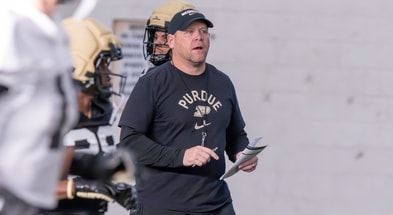How many permanent rivals should B1G teams have? League coaches dish

One? Two? Three? What’s the right number of annual permanent opponents for each Big Ten team?
That’s a question that was discussed at a recent meeting among Big Ten coaches, athletic directors and administrators.
It’s an issue that needs to be resolved as the league moves toward an expected division-less configuration in 2024 when UCLA and USC come aboard to make the Big Ten a 16-team conference.
The Big Ten is expected to stay at nine conference games. And there is a desire to have schools play everybody at least twice in a four-year period. But the big conundrum is deciding on how many protected rivals each school will have annually.
“They want to have permanent opponents,” a Big Ten head coach told On3.com
And there also is a desire for each school to have the same number of permanent foes.
“That was kind of the consensus,” said the head coach. “Whatever that number is, it just needs to be the same because the initial (model) they were talking about, some had one, some had two, some had three. It just didn’t really seem to make much sense (to have a varying number protected rivals) would affect the equity of the rest of the schedule for everybody else.”
A second Big Ten head coach told On3.com: “I think it will be two. I wanted one. But, even my athletic director is like, ‘Hey, if we do one, who’s our rival?,’ which we obviously know. If we have two permanent opponents, we know who they will be. If it’s three, who would it be?
“I figure they probably will meet in the middle and we’ll have two.”
The SEC is having a similar discussion when it comes to the number of annual permanent opponents for each school. And, the SEC seems to be trending toward three per school.
Before any decision is made by the Big Ten, the league head coaches On.3 spoke to think the conference has to know its objective. Is it …
1 To generate revenue through the TV contract?
2 To compete for a national championship, and generate TV revenue?
“If the priority is to have as many teams competing for a national championship, then everything else goes back to that answer,” a third Big Ten head coach told On.3. “If it’s all about generating revenue, and then hopefully competing for a national championship, than it all goes back to that answer.
Top 10
- 1New
Chris Beard
Report: Initiated Texas A&M contact
- 2
Michigan State
Under NCAA investigation
- 3
USC running back
Entering transfer portal
- 4
Texas, Ole Miss
Finalists for prized transfer
- 5Hot
2-round mock draft
5 QBs come off the board
Get the On3 Top 10 to your inbox every morning
By clicking "Subscribe to Newsletter", I agree to On3's Privacy Notice, Terms, and use of my personal information described therein.
“But that’s going to be the first question we’re going to ask the new commissioner: What’s your priority? You can’t say both. It’s A or B.”
The Big Ten has won just one national title during the current four-team playoff model, with Ohio State taking home the banner in the 2014 season—the first year of the current College Football Playoff model. Before that, the Buckeyes took home the title in 2002, and Michigan in 1997. You have to go back to 1968 (OSU) to find the next Big Ten championship before that Wolverines’ co-title in 1997.
“Again, what is the goal?” said the third Big Ten head coach. “That’s where we were as coaches. You have to tell us what the priority is as a league so we can at least set our own personal expectations.
“TV wants the match-ups (for the regular season). But you also want the best teams in the College Football Playoff and not have some lesser of the Power Five conferences who might not be as good as us get more teams in (the playoff), or the SEC get four teams in there because their schedules are easier.”
One potential landmine for playoff teams is the league title games, where a loss can be a resume killer. The Big Ten coaches discussed dumping that event. But, it’s likely the commissioner and others wouldn’t allow it, given the revenue it generates. Plus, in a 12-team playoff, a defeat in a league championship game may not be as detrimental as it can be in a four-team model.
“Yeah, we talked about it,” said the third Big Ten head coach. “But TV is gonna want it. It’s a lot of money for the league. They just have to know that if they are going to keep the title games, people can’t be penalized for losing that game like they are now.”

























